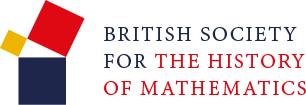Making Mathematics American
Making Mathematics American
Sometimes the push to finish a big writing project can end up feeling like a “shelter in place” order—a foggy dance between writing and sleeping. For the past two months, while sheltering in place because of COVID-19, I’ve been working towards a deadline to finish a full draft of my dissertation. There were no offices, archives, or libraries, and I relied heavily on HathiTrust and others who helped put resources online. After endless hours of writing and sleeping, interspersed with distance runs and homemade meals, I finally submitted a draft to my committee this week. It’s strange to be finishing six years of graduate school from home. But I suppose everything is strange right now.
I joined the Department of Science and Technology Studies at Cornell University in Fall 2014. After earning my bachelor’s degree in Mechanical Engineering, I became fascinated by historical studies of theoretical science. I was especially drawn to the scholarship of historians like Joan Richards and Andrew Warwick, whose work explores the intricacies of abstract thought. Because mathematical knowledge, with its veneer of abstraction and certainty, is often presumed to occur above and beyond the context of its production, studying its history seemed like an exciting and important challenge.
Historians of mathematics have effectively met this challenge by considering the development of theory in terms of embodied and material practices and through the lens of social and political histories. (Some of my favorite examples are: Tragic Mathematics, A More Majestic Order, A Group Theory of Group Theory, Chalk, AfterMath). These studies are often grounded in prior challenges to the image of mathematics as universal and absolute. Rather than a free-floating march through time, the development of mathematical theory—like other forms of knowledge—is shown to be inherently situated and continually renegotiated.
In my own research, I explore the relationships between different forms of knowledge, how they are valued, and who gets to participate. Because these issues were particularly salient during the Progressive Era, including what Karen Parshall and David Rowe have identified as the growth period in American mathematics, I began a project that is now called “Making Mathematics America: Gender, Professionalization, and Abstraction during the Growth of Mathematics in the United States, 1890-1945.”
Like other American sciences, mathematics in the United States shifted during the Progressive Era from practical and educational activities towards research. Unlike other American sciences, however, American mathematics grew conspicuously apart from physical reality. By following their European counterparts into abstract, so-called “modern,” fields of research, American mathematicians risked alienation in a nation known for its “Yankee ingenuity” and practical know-how. Overall, my dissertation argues that, while the growth of American mathematics meant establishing societies, journals, and graduate programs, it also meant reconfiguring what counted as mathematical work, who counted as a mathematician, and how each was thought to contribute to American society.
While early-twentieth-century Americans were working to build a mathematics community in the United States, prominent researchers in Europe were working to rebuild the foundations of mathematics itself. Foundational questions, in turn, led some to reconsider the epistemological status and meaning of mathematics itself, as well as its value and values. My dissertation therefore examines the role of foundational studies in the United States through a group of scholars—later known as American Postulate Theorists—who worked to build and compare axiom, or postulate, systems for different fields. By exploring the technical development of mathematics alongside popular, administrative, and biographical sources, my analysis considers the growth of mathematics in the United States as a series of both scientific and cultural negotiations. Specifically, I consider the role of abstract and foundational research in redefining what it meant to be an American mathematician. By choosing to encode their professional identities in the ideals of modern abstractions, American mathematicians forfeited access to traditional forms of masculinity that were associated with military or industrial applications. Instead, they marshalled other forms of manliness tied to nostalgic traditions of farm work, rugged individualism, and, eventually, professional exclusivity and scholarly prestige. Overall, my dissertation identifies three ways in which mathematics was rendered compatible with American ideals: through the well-worn narrative of the self-made man, in proximity to American pragmatisms, and by asserting both scientific support for and humanist critiques of modern industrial progress.
I have been supported in this research, including virtually over the past few months, by my advisor, Suman Seth, and committee members Ronald Kline and Aaron Sachs. I am also very grateful to friends and family, to colleagues at Cornell and around the world, and to the BSHM. I still have revisions and the defense to get through, but it’s full (stay-at-home) steam ahead!
